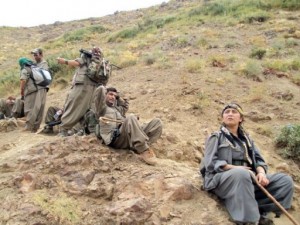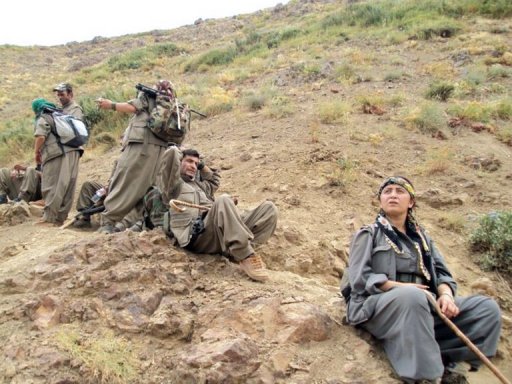
By Ceren Kumova (AFP) – Kurdish fighters have begun withdrawing from Turkey into their stronghold in Iraq, Kurdish sources said Wednesday, in a major step towards ending a decades-long conflict that has killed tens of thousands of people.
The pullout is the first visible sign that months of fragile talks between the state and the outlawed Kurdistan Workers’ Party (PKK) could succeed in ending 29 years of guerrilla war.
“We know that they have started moving,” Selahattin Demirtas, a pro-Kurdish lawmaker actively involved in the process, told AFP.
About 2,000 rebel fighters are expected to begin leaving Turkey on foot, travelling through the mountain, ous border zone to reach their safe havens in the inhospitable Qandil mountains in northern Iraq.
There they will join 5,000 fellow militants at the command base which has been used as a springboard for attacks against Turkish security forces.
Ankara did not confirm the start of the pullout but Deputy Prime Minister Bulent Arinc said: “We are following the process closely.
“It is hard to say with precision what is happening at what time,” Arinc said in televised remarks. “What matters to us is the result, and it looks like we are getting there.”
In the meanwhile, parliament passed Wednesday a list of candidates selected by the ruling Justice and Development Party (AKP) and the pro-Kurdish Peace and Democracy Party (BDP) for a commission tasked with overseeing the peace process.
Opposition lawmakers who refused to appoint candidates for the commission left the parliament floor in a show of protest, accusing the government of cooperation with the PKK.
The withdrawals are expected to take three to four months, with several media outlets reporting that the rebels have been on the move for weeks and that May 8 is a “symbolic” date of departure.
Rebels are moving at night to avoid tension and publicity that might jeopardise their security, Demirtas said.
A PKK fighter using the pseudonym Delal Amed said the guerrillas were retreating but “would not hesitate to resist” if attacked.
“If we are taking this step today it is because we have the power to carry out a democratic and political struggle,” Amed was quoted as telling pro-Kurdish Firat news.
On Tuesday, the rebels said they would not renege on their promise to withdraw following an order from jailed PKK leader Abdullah Ocalan, onetime nemesis of the Turkish state, but have not yet laid down their arms.
Ocalan, known as “Apo” or uncle to Kurds but branded a “baby killer” by Turks, called in March for a historic ceasefire after months of clandestine peace talks with Turkish security services.
“We have a chance at peace and if we cannot see it through this time around, everything will be much worse,” said Aysel Tugluk, another pro-Kurdish lawmaker.
The rebel group claimed Tuesday that Turkey was boosting troop numbers near the border, warning against provocations which could hamper the process, but the Turkish army has not confirmed the measures.
No fatal clashes have occurred in recent months, the first such lull in years.
“We have no doubt about the state but fear provocation from dark forces,” Demirtas said, referring to the possibility of ambushes by splinter paramilitary groups which may not be in favour of the peace process.
Mass withdrawals in 1999 were disrupted when Turkish forces ambushed departing rebels, killing around 500 people and wrecking hopes for a permanent peace.
Prime Minister Recep Tayyip Erdogan has repeatedly vowed that retreating rebels “will not be touched” and said “laying down weapons” should be the top priority for the PKK.
The PKK however is demanding wider constitutional rights for Turkey’s Kurds, who make up around 20 percent of the 75 million population, before disarming.
The group, which is blacklisted as a terrorist group by Ankara and the West, took up arms in 1984 and since then the conflict has killed around 45,000 people.
A permanent peace could transform Turkey’s impoverished Kurdish-majority southeast, where investment has remained scarce and infrastructure insufficient due to the threat of clashes.
It will also impact Erdogan’s political future, after he braved a major nationalist backlash in revealing the negotiations with Ocalan.
Millions of Kurds are expecting Ocalan, whose death sentence was commuted to life in prison in 2002 after EU pressure, to be pardoned and join political life.
Ocalan said in his March peace call that a ceasefire would be the beginning of a “new era” for the Kurdish movement.
“It is not the time to give up the struggle, but to start a different one,” Ocalan said.


